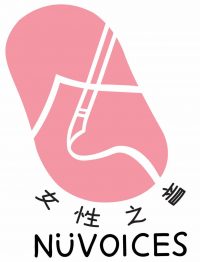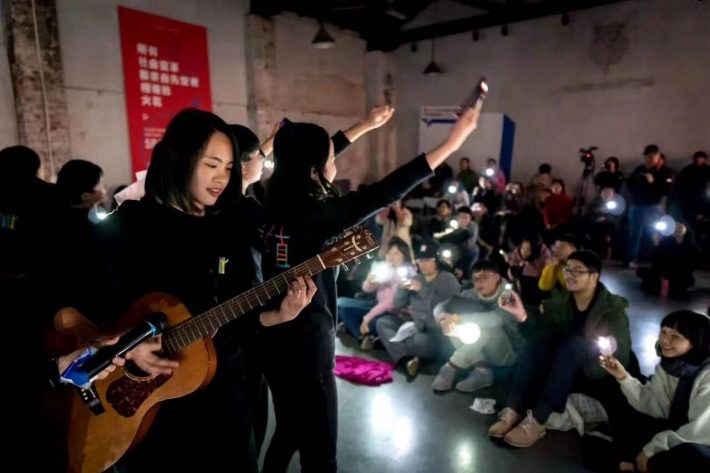BY ANDRÉ-ANNE CÔTÉ
After my graduation at Peking University in May 2019, a Chinese friend invited me to a surprise performance — telling me the location only an hour before the show would begin. After rushing through a crowded Beijing subway on a hot summer night, and going into a skyscraper, I finally arrived in an over-air conditioned office room.
The desks and chairs were piled into a corner; the middle was left empty for the audience to form a circle. As people sat down in this unconventional venue, the atmosphere was one of excitement — the troupe had come all the way from Guangzhou. My friend, who sat beside me, was thrilled to introduce me to this artist network, but he was determined not to spoil the surprise.
After a round of applause, the actors emerged. First, they asked for a volunteer, prompting everyone to raise their hands very quickly. I didn’t understand the concept at first. But as the show moved on, I saw how important it was for the audience to find their voices. Out of respect for the privacy of those who spoke, I will only share a few details.
The host picked a man from the crowd at random and asked him to share his story. He spoke about his experience being HIV-positive. After he finished speaking, the artists improvised a short play, drawing on different techniques including dancing and singing.

It triggered a mix of emotional responses; around me, the crowd cried, laughed, and applauded at the same time. Then, the host asked for other volunteers to speak. We heard from a mother who was the victim of domestic violence, and then a queer teenager who shared their experience.
This unique theatre concept was constructed by a group of individuals in their twenties from Guangzhou, who had formed the collective two years ago.
Previously social workers, musicians and teachers, the performers had all fallen in love with theatre at some point in their lives. They initially came together to create the “Youwan Youzhi Theatre Troupe” (有弯有直剧团 ). After its dissolution, several core members resigned from their jobs to devote themselves full-time as founders of the new “Guangzhou Temporary Theatre Troupe” ( 广州临时剧团 ), as well as other performing arts ventures. Since then, the troupe has organized more than 100 drama performances and more than 50 drama workshops.

In 2019, the team organized their first national tour, including stops in various cities such as Beijing, Chengdu, Shenzhen and Hainan. The troupe, which promotes the development of popular theater in mainland China, has attracted the attention of regional media such as Curiosity Daily, Hong Kong Cable TV, Chengdu Cover News, Duan Media, and Japan’s NHK, (引起好奇心日报、香港有线电视、成都封面新闻、端传媒 ).
Similarities to the theatre concept can be found by looking back into the past. In 1996, Mo Zhaoru (莫昭如), a master in popular theatre, introduced Hong Kong to ‘The Theater of the Oppressed’ and ‘One Person One Story Theatre’ (一人一故事剧场), forms that are defined by the term “Playback Theatre” in English. These theatrical forms were later introduced to Mainland China in Guangdong Province, the first region in China to open up to the outside world. In Playback Theater, the audience is no longer a passive receiver, and instead feeds the performance.
But how does this Western concept translate in Chinese culture? And how can this type of performance help Chinese people cope with the pressures of post-socialist development?
Hoping to answer these questions, In October of last year I reached out to one of the members of the troupe, who goes by the nickname “Xixi.”
“People can create a safe space in the theater, where we listen to each other’s life stories,” Xixi told me. “The actors sincerely perform, and give this performance to the sharers. The emotions and feelings shared by everyone flow in the entire space, which is very beautiful.”

To further create a sense of belonging, the troupe has created powerful slogans such as “Never give up,” “Anyone can love” and “Father, mother I love you.” In a country where discussion around mental health is still largely considered taboo, Xixi believes the the Playback Theatre format has therapeutic value. “The most meaningful thing should be to listen to the story of every ordinary person and interpret it,” she says.
Xixi, who originally worked as a kindergarten teacher, told me she met her mentor, an artistic director of the Hong Kong Good Drama Theatre Company, in 2017. A few years later, in January 2019, she started working full-time as a drama actor and created her own troupe.
While Xixi once considered the arts a privilege enjoyed by the elite, an understanding of more accessible folk theatre changed this view. Xixi says being a part of the Playback Theatre troupe acted as a form of art therapy for her.
“Because folk theater is the theater for the people; of the people and by the people,” she said. “In the world of drama, I am a piece of plasticine. I can exist in all kinds of forms: Funny, boring, beautiful, or ugly.”
But the event of a global pandemic has added complexity to China’s creative scene, with the performing arts industry becoming even more precarious as a result. In a society where screen time is high, Playback Theatre’s philosophy has always been to “reconnect” people to the present moment and allow for a physical experience, something which has grown more difficult during the pandemic.

The troupe, which halted its activities until July 2020 when the team adopted a virtual format, are looking forward to the possibility of another tour. In the meantime, they are trying to reach as many people as possible online. “The most annoying is not being able to work right now. Playback Theater necessitates face-to-face communication,” Xixi said.
As I think back to the first time I saw the troupe’s performance, I recall finding myself speechless. How could this type of performance even be possible in China?
I must admit that I was also among those who spoke during the show, I volunteered my life story as a Sino-Canadian adoptee. For me, it provided an opportunity to raise awareness about international adoption, an issue that is considered taboo in China. I was afraid that I would cause some in attendance to “lose face,” by addressing such a sensitive issue. But I wanted to make the listeners understand that unwanted daughters and disabled children are also the losers of China’s economic development.
Instead, the reaction was one of support. I received touching words from the audience, and the troupe asked my permission to include my testimony in their next documentary.
Like Xixi, I believe that community-based art can provide alternative ways of healing in today’s China — this is something I experienced myself. Perhaps we should consider Playback Theatre not just as a form of art therapy, but also as a driver of quiet social change.
Follow the theatre troupe on Wechat:

About the author
André-Anne Côté is a culturally French-Canadian Chinese adoptee who was raised in Quebec, Canada. In addition to a B.S. in Anthropology from Laval University, she holds a Master’s in International Relations from Peking University. Her thesis examines the return of Sino-Canadian adoptees to their homeland. Her writing has been published in NüStories, Inkstone and others. Find her on Twitter and Instagram.
About the editor
Elizabeth Beattie is a New Zealand-born journalist and writer based in Hong Kong. She had reported for publications including the Guardian, Al Jazeera, SBS and the UK Telegraph, covering politics, human rights and culture. Visit her website.

